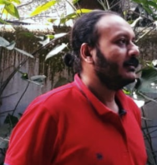The First Kadamba Of The War
Translated from the Bengali by Bishnupriya Chowdhuri
That year the price of the Kadamba flowers simply skyrockets. Crestfallen Mansur asks the seller-girl, “What are you pricing really—flowers or liters of oil?”
The girl, not giving a rat’s ass at the taunt, simply says, “Take it or leave it!”
But Mansur presses on, “C’mon, tell me really? What’s going on with the flower prices?”
The girl, visibly irked now, answers, “Don’t you know about the war in the foreign land? That’s what is going on.”
Mansur feels what can be described as a mix of an extreme sense of vulnerability and utter shock and ends up blurting out, “Did you get the flowers from Ukraine or Russia?”
“Why don’t you ask the Government? When they get a hold on the prices of rice, salt, and oil, flowers too will be cheap again.” The girl shoots her final comment as she gets going. Well, even after all that, just to keep to the tradition, Mansur gets a single stalk of the flower unlike the bouquet as he would otherwise.
And let’s say, he comes home drenched under a torrential downpour. Then together, they start the porridge and in the middle of all that, an embarrassed Mansur offers Maina that single stalk of Kadamba like every year. Maina, ecstatic with the flower, stirs up the entire household. Outside, it rains incessantly.
That night, they go to sleep with the flower between them. Tears of joy spill Mansur’s eyes; aching with happiness, Maina wets her pillow. Deep at night, their room sinks under the fragrance of the flower. Suddenly, they wake up and discover that they were swimming in the redolence of the Kadamba flower.
Deeply amused, Mansur wonders, “Is it okay to swim in such fragrance when there is a war going on? What do you say Bou?”
Maina opens the window and says, “Let the fragrance flood the world of shells and gunpowders.”
Eventually, they too slip out of the window and swim in the now redolent yard, and then with the flooding floral scent now pervading the entire city, they swim on…
Who knows if we shall catch a glimpse of them ever again when the war will no longer be there and we will be out to buy Kadamba flowers for cheap.
The Passenger
Translated from the Bengali by Rituparna Mukherjee
My grandfather had narrated the tale of the headless horse! The horse would howl in the inky blackness of the night, running past the dark banks of the blind river. The headless horse’s strange cry would scare them! My great-grandmother would send my grandfather to sleep reminding him of the horse’s piercing cry. When he would refuse to sleep, she would say, “The headless horse stops at the courtyards of the homes where the children don’t sleep! It then takes the sleepless child and gallops away howling loudly. That child is lost forever! The child never returns to his parents.”
Perhaps my grandfather would then ask, “But why would they not return?”
My great-grandmother would say, “Well, the horse doesn’t have a head, and if it doesn’t have a head, it surely doesn’t have eyes! It loses its way! How will it return if it cannot spot the way?”
As a result, my grandfather would go to sleep. Perhaps no one had the mind to ask that if the headless horse was without a head, how was it that it returned the same way every night, howling by the banks of the blind river? My grandfather carried the story of the headless horse with him till the day he died. He related the story to his children a number of times.
My father was a stubborn man. He had a few horses. He was a fabulous horse-rider! I have heard this from my mother. My father had a gun. He would leave in the dead of the night, armed with his gun, in search of the headless horse. When he would return at the crack of dawn, he would look dejected, his stance like that of a defeated soldier. My father did not lose his eagerness for the legendary horse till his death. He took care of all his horses himself. He told me the night before he died that his inability to catch the headless horse was his life’s sole failure. I had asked him, “Have you come across the blind river?” He stared silently at my face and turned mute!
I am my father’s failure of a child! I have no interest in horses. Although I have laid a paternal claim to his gun. I care for the gun myself. It has grown more valuable in my hands! I have consciously avoided passing down the generational tale of the headless horse to my child. A few days back, my child told me an imaginary story of a two-headed horse. I asked him in awe, “Is it possible that a two-headed horse actually exists?” He told me that the horse that inhabited his dreams had two heads and so it was definitely possible. Is it possible then that the blind river exists as well?
24th April 2019.
Missing
Translated from the Bengali by Sukti Sarkar
“The tree used to be right here but no more,” recounts Torap’s mother. “It was here that he cast his long shadow, and swayed his unkempt head. Here, the monsoon rains drenched him green and he stood still. But no more. No shadow, not a trace of the leaves, not a whiff of his body.” We all took a look at each other. She goes on, “The day after the tree went missing, mother of the tree burst into tears. At first, she whimpered, next, she whined, then sobbed aloud, and finally wailed out loud. Then came a day when she stopped. For a long time, she had no speech. The other trees pestered. Why wouldn’t she speak? What makes her dumb? Birds stopped perching on her branches. Maybe they too were in grief, maybe they shied away knowing it was all about grief… shared grief… One day, the parrot showed up, who knows from where, but it was a parrot for sure, and I have no idea what it said to the mother of the tree, but the parrot, thereafter, flew to the oldest Banyan tree of the forest and settled. What the hell the parrot mumbled to the Banyan, I cannot tell you because to tell you the truth, I don’t understand the parrot’s tongue. When the bird finished talking, I heard the Banyan sigh. I think he sighed because he was sad to have grown old or maybe for no good reason, none at all… Perhaps I have it all wrong. The parrot went on whispering to the other trees till something happened all over the forest. Whispers were heard from all corners. Maybe I am getting it wrong; probably, I had heard nothing at all or maybe they were all busy whispering to each other. The parrot disappeared behind the leaves or maybe it deliberately hid inside a dense tree so that no one could find it.” As we listen to Torap’s mother speak, we exchange looks. We feel sad. We realize how deep she was in grief. Torap’s mother goes on, “One day, after all this, mother-tree’s leaves turned pale, father-tree’s leaves wilted and dried up. Only then it came to our notice that the leaves on the brother and the sister tree too were drooping. And the tree that stood next to the missing tree, which I take to be the Lover of the Missing—had all her leaves in tears. Silent tears. When sound matters no more, it’s useless to raise a cry. Soon all of mother-tree’s leaves turned yellow. Father-tree’s leaves went dry and the branches of both brother and sister trees fell to sickness. The lover tree quit all nourishment. That day, the other trees of the forest were heard heaving. None of them uttered a word. Only the lone old Banyan Tree seemed to have grown older in grief. In a few days, all the leaves fell off the mother and the father, and the branches of the brother and the sister were diseased. The lover of the missing one withered. A day came when it poured heavily and the soil softened, father-tree stumbled to the ground and the mother no longer enlivened by the rain. So, the news of the death spread across the entire forest. Other trees worried that death wouldn’t spare the brother and the sister either. And lover of the tree that went missing, withered completely as she could not wait any longer.” Torap’s mother falls silent. Saddened, we wonder if the trees of the family of the suddenly missing tree decided to embrace death through a hunger strike? The other trees, whether frightened and silenced by the missing tree or by the event that led to his disappearance, sigh, but are too scared to protest lest they too go missing for the offense of raising questions. Consequently, we too begin to think, who exactly shoulders the burden of this death? At this point, she breaks her silence. “Lover of the missing tree shrivels to death one day. In a few days that follow, termites build their nest over the dried roots of brother and sister trees. The mother tree, however, still has some life in her. She wilts and withers but keeps alive, waiting… They say, her soul is as soft as a flower but her body is as hard as a rock. The other trees of the forest lament because mother-tree has gone crazy or perhaps, they welcome the respite offered by the idea of her loss of sanity. And that’s because she murmurs day in and day out—where has my boy gone? Who took him away? Was it a Jinn who led him astray to the land unknown? Do any of you know? His mother and the father cry their hearts out… his brother and the sister wail… can any of you tell where their brother went? As the mother laments, the other trees of the forest begin to cry. They grieve. Days and nights pass, and birds of many kinds descend on their branches, build nests, and lay eggs. They help little birds hatch and fly away. Seasons change, new leaves appear, and old ones turn yellow and shed. And when they hear the whimpers of the old mother tree, they begin to feel guilty. Some of them wipe their eyes quietly, scared of sobbing aloud. The old Banyan grows even older and heaves.“ Torap’s mother too begins to whimper again. Some of our eyes well up. We feel guilty, somewhat.
Also, read an Assamese story by Manoj Kumar Goswami, translated into English by Harsita Hiya, and published in The Antonym:
Follow The Antonym’s Facebook page and Instagram account for more content and exciting updates.





























0 Comments